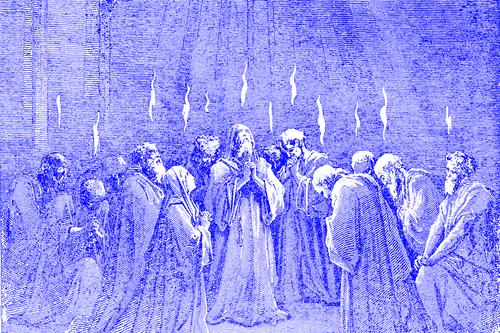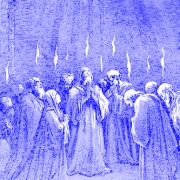“What Not to Say to Yourself” – 1 Samuel 27:1 – October 02 2020
/0 Comments/in Enduring Words for Troubled Times/by David Guzik“Shining Out That All Can See” – Matthew 5:14-16 – October 01 2020
/0 Comments/in Enduring Words for Troubled Times/by David Guzik“Rolling the Dice” – Acts 1:24-26 – September 30 2020
/0 Comments/in Enduring Words for Troubled Times/by David Guzik“Where the Real Power Is” – Exodus 5:1 – September 29 2020
/0 Comments/in Enduring Words for Troubled Times/by David Guzik“Receiving New Life” – 2 Kings 4:32-33 – September 28 2020
/0 Comments/in Enduring Words for Troubled Times/by David GuzikReasons to Believe
/1 Comment/in For Pastors, Preachers, Bible Teachers/by David GuzikDear Pastor, Preacher, or Bible Teacher –
Here’s a thought for your Monday morning, after a weekend of serving God, His people, and a needy world. It’s a thought from Matthew 8:26:
But He said to them,
“Why are you fearful, O you of little faith?”
Then He arose and rebuked the winds and the sea, and there was a great calm.
It’s a great passage, isn’t it? Perhaps you have preached many times on this scene of Jesus rebuking wind and waves, and how He can calm our stormy seas.

Allow me to take this passage and apply it to us as pastors, preachers, and Bible teachers. Focus on the question Jesus asked: Why are you fearful, O you of little faith? Jesus rebuked their fear and unbelief – not for waking Him up or for asking for help. We shouldn’t think that Jesus was in a bad mood from being awakened. He was troubled at their fear, because fear and unbelief go together.
In fact, Jesus dealt with His disciples before He dealt with the storm! Relatively speaking, the storm was easy to deal with. Attention needed to be given to the disciples first.
I think Jesus rebuked their fear because they actually had many reasons to have faith, even reasons for great faith.
– They had just seen Jesus do significant miracles, showing great power and authority.
– They had seen an example of great faith with the centurion who trusted Jesus to heal his servant.
– They had Jesus with them in the boat and they saw Jesus sleeping; His peace should have given them peace.
Friend, maybe you have some genuine reasons to be afraid. For the disciples, the storm and the threat from it were real.
Here’s the truth: whatever your reasons for fear, God has given you even greater reasons for faith. If you can’t think of any of those reasons, ask God to show you. Call a friend and tell them you are looking for more reasons and greater reasons to believe. The reasons are there – our part is to perceive them.
Go out and keep serving God, His people, and a needy world, knowing that you have great reasons to believe – no matter what the reasons for fear may be!
Blessings to You in Jesus’ Name – David Guzik
Click Here to Receive Email from David for Pastors, Preachers, and Bible Teachers
Tongues of Fire
/2 Comments/in Weekly Devotional/by David GuzikThen there appeared to them divided tongues, as of fire, and one sat upon each of them. And they were all filled with the Holy Spirit. (Acts 2:3-4a)
As the 120 disciples of Jesus gathered in the upper room, a remarkable thing happened. First, there was an unusual sound, something that sounded like a strong wind, and the sound filled the whole house (Acts 2:2).
Then, after the sound of the wind had started, they saw another remarkable thing: there appeared to them divided tongues as of fire, and one sat upon each of them. A flame appeared above the head of every disciple. Probably, the description divided tongues, as of fire has the sense that the flames were active and flickering – appearing as if they were burning, but leaving no mark, even as one sat upon each of them.

This amazing occurrence probably should be connected with John the Baptist’s prophecy that Jesus would baptize you with the Holy Spirit and with fire (Matthew 3:11).
Through the Bible, the idea behind the picture of fire is usually purification, as a refiner uses fire to make pure gold; or fire can burn away what is temporary, leaving only what will last. This is an excellent illustration of the principle that the filling of the Holy Spirit is not just for abstract power, but for purity.
In certain places in the Old Testament, God showed His special pleasure with a sacrifice by lighting the fire for it Himself – that is, fire from heaven came down and consumed the sacrifice. The experience of the followers of Jesus on Pentecost is another example of God sending fire from heaven to show His pleasure and power, but this time, it descended upon living sacrifices (Romans 12:1).
The Holy Spirit sat upon each of them. One commentator (A.T. Pierson) said there was a deliberate meaning behind that word sat – that it has the idea of permanence of position and a lasting condition. That idea is important.
Under the Old Covenant, the Holy Spirit rested on God’s people more as a nation, that is, Israel. But under the New Covenant, the Holy Spirit rests upon God’s people as individuals – the tongues of fire sat upon each of them. This strange phenomenon had never happened before and would never happen again in the pages of the Bible, but was given to emphasize this point: that the Spirit of God was present with and in and upon each individual.
Most important of all, they were all filled with the Holy Spirit. Essentially, the sound of the wind and the tongues, as of fire, were only unusual, temporary phenomenon, which accompanied the true gift – being filled with the Holy Spirit.
Today, we shouldn’t expect to hear the sound of the wind or see a tongue of fire when the Holy Spirit moves among God’s people. But we can and should expect to be filled with the Spirit as we receive in faith and let Him refine and purify us.
Ein daherfahrender gewaltiger Wind
/0 Comments/in Wöchentliche Andacht/by David GuzikUnd es entstand plötzlich vom Himmel her ein Brausen wie von einem daherfahrenden gewaltigen Wind und erfüllte das ganze Haus, in dem sie saßen. Und es erschienen ihnen Zungen wie von Feuer, die sich zerteilten und sich auf jeden von ihnen setzten. Und sie wurden alle vom Heiligen Geist erfüllt. (Apostelgeschichte 2,3-4a)
Nachdem Jesus in den Himmel aufgestiegen war, trafen sich die Jünger um zu beten und Gott zu suchen und um auf den Heiligen Geist zu warten. Gott hielt sein Versprechen, und hier in Apostelgeschichte 2 lesen wir, wie der Heilige Geist an Pfingsten auf die Jünger kam. Das Ausgießen der Heiligen Geistes ging mit einigen seltsamen Dingen einher: einem seltsamen Geräusch und einem seltsamen Anblick.

Achte auf das seltsame Geräusch: es entstand plötzlich vom Himmel her ein Brausen. Dass das Geräusch eines daherfahrenden gewaltigen Winds im Zusammenhang mit dem Ausgießen des Heiligen Geistes genannt wird, liegt daran, dass in der hebräischen und griechischen Sprache das Wort für Geistdasselbe ist wie für Atem oder Wind. Das Brausen vom Himmel war das Geräusch des Heiligen Geists, der auf die Jünger ausgegossen wurde.
Das Brausen dieses schnellen gewaltigen Windes ließ jeden Jünger, der die hebräischen Schriften kannte, an den Heiligen Geist denken.
-
In 1. Mose 1,1-2 ist es der Geist Gottes, der als Atem/ Wind Gottes über den Wassern der neu erschafften Erde wehte.
-
In 1. Mose 2,7 ist es der Geist Gottes, der als Atem/ Wind Gottes über den neu erschafften Mensch wehte.
-
In Hesekiel 37,9-10 ist es der Geist Gottes, der als Atem/ Wind Gottes über die trockenen Knochen Israels weht und neues Leben und Kraft bringt.
Diese eine Zeile sagt uns viel darüber, wie der Heilige Geist wirkt.
-
Plötzlich: manchmal wirkt Gott plötzlich
-
Brausen: es war echt, auch wenn man es nicht anfassen konnte; sie konnten es hören.
-
Vom Himmel: es kam nicht von der Erde; es war nicht hier gemacht oder manipuliert.
-
Gewaltig: es war voller Kraft, mit großer Macht.
Beachte, dass so etwas nirgendwo sonst in der Apostelgeschichte passierte, wenn der Heilige Geist ausgegossen wurde. Es gab einige andere Male, an denen der Heilige Geist Gottes Kinder erfüllte (Apostelgeschichte 4,8; 4,31; 13,9; 13,52; 19,6). Das war jedesmal ein wundervolles Werk des Geistes, doch bei keiner dieser Begebenheiten hörten sie vom Himmel her ein Brausen wie von einem daherfahrenden gewaltigen Wind. Dieses seltsame Geräusch gab es nur an diesem einen Tag.
Manchmal tut Gott etwas Einmaliges – etwas Besonderes zu einem einzigen Zeitpunkt. Kannst du dir vorstellen wie die Jünger später sagten: „Heute wurde wir nicht mit dem Heiligen Geist erfüllt, denn wir haben das Geräusch nicht gehört“? Oder: „Das nächtste Mal müssen wir dasselbe Geräusch hören – sogar noch lauter!“
Diese Art zu Denken ist eine Falle. Überlasse Gott zu entscheiden, wann eine besondere Erfahrung notwendig ist und wann nicht.
Un viento recio que soplaba
/0 Comments/in Devocional Semanal/by David GuzikY de repente vino del cielo un estruendo como de un viento recio que soplaba, el cual llenó toda la casa donde estaban sentados; Y se les aparecieron lenguas repartidas, como de fuego, asentándose sobre cada uno de ellos. Y fueron todos llenos del Espíritu Santo. (Hechos 2:2-4a)
Después de que Jesús ascendió al cielo, los discípulos se juntaron para orar y buscar a Dios, esperando al Espíritu Santo que se les había prometido. Dios cumplió Su promesa, y estas palabras de Hechos 2 nos cuentan cómo descendió el Espíritu Santo sobre los discípulos en el día de Pentecostés. Este derramamiento del Espíritu Santo llegó con un sonido extraño y con una vista extraña.

Nota el sonido extraño: y de repente vino del cielo un estruendo. La asociación del sonido de un viento recio… cual llenó toda la casa con el derramamiento del Espíritu Santo probablemente tenga conexión con el hecho de que tanto en el idioma griego como en el hebreo, la palabra espíritu es la misma palabra que significa aliento o viento. El estruendo que vino del cielo aquí fue el sonido del derramamiento del Espíritu Santo sobre los discípulos.
El sonido de este viento recio haría pensar en la presencia del Espíritu Santo a cualquiera de estos discípulos que conocían las Escrituras hebreas.
– En Génesis 1:1-2, es el Espíritu de Dios como el aliento/viento de Dios que se movía sobre la faz de las aguas.
– En Génesis 2:7, es el Espíritu de Dios como el aliento/viento de Dios que sopló aliento de vida en el hombre recién creado.
– En Ezequiel 37:9-10, es el Espíritu de Dios como el aliento/viento de Dios moviéndose sobre los huesos secos de Israel dándoles vida y fuerza.
Esta sola frase nos dice mucho sobre cómo se mueve el Espíritu Santo:
– De repente: A veces Dios se mueve de repente.
– Estruendo: Era real, aunque no se podía tocar; era algo real que les llegó a los oídos.
– Del cielo: No fue de la tierra; no fue creado, manipulado, o modelado aquí.
– Recio: Vino lleno de fuerza, llegando con gran poder.
Note que esto no sucedió en ningún otro lugar en el libro de los Hechos cuando el Espíritu fue derramado. Varias otras veces el Espíritu Santo llenó poderosamente al pueblo de Dios (Hechos 4:8, 4:31, 13:9, 13:52, 19:6). Esas fueron obras maravillosas y válidas del Espíritu, pero en ninguna de esas otras ocasiones escucharon un estruendo del cielo como de un viento recio que soplaba. El sonido extraño era para ese día en particular, pero no de importancia duradera.
A veces, Dios realiza cosas que solo pasan una vez, algo especial para una sola ocasión. ¿Puedes imaginarte si, en otra ocasión posterior, los discípulos dijeron: “Hoy no fuimos realmente llenos del Espíritu porque no escuchamos ese sonido del cielo”? O, si dijeron: “La próxima vez, debemos escuchar el mismo sonido, ¡y escucharlo aún más fuerte!”
Ese modo de pensar es una trampa. Dale a Dios el mérito de saber cuándo es necesaria una experiencia especial y cuándo no la es.





